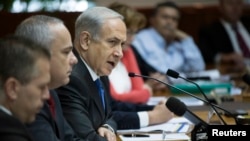JERUSALEM —
Israeli Prime Minister Benjamin Netanyahu called on Sunday for no relaxation of international pressure on Iran to curb its nuclear efforts after the election of a new president widely hailed as a moderate.
Netanyahu said it was Iran's supreme leader, Ayatollah Ali Khamenei, and not the newly elected president, Hassan Rohani, who set a nuclear policy that has been challenged by tough economic sanctions and the prospect of military action.
"The international community must not give in to wishful thinking or temptation and loosen the pressure on Iran for it to stop its nuclear program," the right-wing Netanyahu told his cabinet, according to a statement released by his office.
But Israeli President Shimon Peres, gave a different assessment of possible change in nuclear activities that Israel and the West fear are directed towards developing atomic bombs. Iran says its is enriching uranium for peaceful purposes only.
Asked if Rohani, a former nuclear negotiator with world powers, would alter the course of the nuclear program, Peres told Reuters, "He said he will not go for these extreme policies. I am not sure he specified his policies. But it will be better, I am sure, and that is why the people voted for him."
A Nobel Peace Prize laureate, Peres holds a largely ceremonial position and has little influence on decision-making in Israel. But his comments added to a burgeoning debate among Israelis over the meaning of Rohani's surprise victory.
"It [the result] surprised all the experts and all the prophets, and this is really intriguing. Why? Because apparently there are hidden forces and strengths that were unseen or underestimated," Peres said.
Ephraim Halevy, a former head of Israel's Mossad intelligence agency, said on Israel Radio that Rohani's election "is the biggest failure Khamenei has suffered since coming to power."
The poll's outcome, Halevy said, was an expression of the Iranian people's "anger and frustration" over the effect of international sanctions that have hit them hard as a result of Khamenei's nuclear policy.
Netanyahu, however, said Israelis "are not deluding ourselves" in the wake of Rohani's election.
"Iran will be judged by its actions," he said. "If it continues to insist on developing its nuclear program, the answer must be clear - to stop it by any means."
Israel, widely believed to be the Middle East's only atomic power, has signaled it could take military action against Iran if international sanctions and diplomacy fail to bring about a change in its nuclear policy.
The United States, Israel's main ally, has cautioned against any go-it-alone attack and said time remains for peaceful efforts to persuade Iran to change course.
"The greater the pressure on Iran, the greater the chance of bringing a halt to the Iranian nuclear program, which remains the greatest threat to world peace," Netanyahu said.
Netanyahu said it was Iran's supreme leader, Ayatollah Ali Khamenei, and not the newly elected president, Hassan Rohani, who set a nuclear policy that has been challenged by tough economic sanctions and the prospect of military action.
"The international community must not give in to wishful thinking or temptation and loosen the pressure on Iran for it to stop its nuclear program," the right-wing Netanyahu told his cabinet, according to a statement released by his office.
But Israeli President Shimon Peres, gave a different assessment of possible change in nuclear activities that Israel and the West fear are directed towards developing atomic bombs. Iran says its is enriching uranium for peaceful purposes only.
Asked if Rohani, a former nuclear negotiator with world powers, would alter the course of the nuclear program, Peres told Reuters, "He said he will not go for these extreme policies. I am not sure he specified his policies. But it will be better, I am sure, and that is why the people voted for him."
A Nobel Peace Prize laureate, Peres holds a largely ceremonial position and has little influence on decision-making in Israel. But his comments added to a burgeoning debate among Israelis over the meaning of Rohani's surprise victory.
"It [the result] surprised all the experts and all the prophets, and this is really intriguing. Why? Because apparently there are hidden forces and strengths that were unseen or underestimated," Peres said.
Ephraim Halevy, a former head of Israel's Mossad intelligence agency, said on Israel Radio that Rohani's election "is the biggest failure Khamenei has suffered since coming to power."
The poll's outcome, Halevy said, was an expression of the Iranian people's "anger and frustration" over the effect of international sanctions that have hit them hard as a result of Khamenei's nuclear policy.
Netanyahu, however, said Israelis "are not deluding ourselves" in the wake of Rohani's election.
"Iran will be judged by its actions," he said. "If it continues to insist on developing its nuclear program, the answer must be clear - to stop it by any means."
Israel, widely believed to be the Middle East's only atomic power, has signaled it could take military action against Iran if international sanctions and diplomacy fail to bring about a change in its nuclear policy.
The United States, Israel's main ally, has cautioned against any go-it-alone attack and said time remains for peaceful efforts to persuade Iran to change course.
"The greater the pressure on Iran, the greater the chance of bringing a halt to the Iranian nuclear program, which remains the greatest threat to world peace," Netanyahu said.











